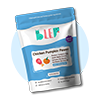Why is protein important for a dog?
Every dog needs a balanced diet, with enough protein, fats, carbohydrates, vitamins, minerals, and other macro- and micronutrients. Among these, protein plays a very important role in a dog’s diet because it consists of organic compounds called amino acids that build up a significant part of a dog’s body: muscles, hair, skin, nails, organs, hormones, etc. So, essentially, proteins are the building blocks of the body. Here are some of the major functions of protein in the body:
Keeps muscles and soft tissue healthy: Protein helps build, protect and heal the body’s ligaments, tendons, cartilage, nerves, etc.
Provides energy: Protein is also a big energy source. It is recommended that 18-25% of a dog’s daily calorie needs should be fulfilled by protein.
Maintains coat and skin: It helps maintain and protect a dog’s coat and skin, keeping the coat shiny and soft and the skin healthy.
Boosts immunity: Proteins help in making antibodies that protect the body from infections and diseases.
Produces hormones: For healthy hormone production, protein is vital. Hormones help in regulating blood pressure, growth, reproduction, digestion, and a host of other functions.
Characteristics of a German Shepherd
A German Shepherd is a large breed dog, especially known for its active lifestyle and intelligence. They are agile, muscular, and courageous, and have the ability to learn commands well, so they have traditionally been categorised as working dogs.
Earlier, they would primarily be kept for herding sheep. Nowadays, they’re really active in the army and the police as trackers and search-and-rescue dogs, as well as guard and patrol dogs. Even as a family pet, they’re always active and need lots of exercise. Therefore, German Shepherds typically need a lot of protein in their diet.
German Shepherds also have a thick double coat, so its growth and maintenance are linked to protein intake as well.
A common form of ailment among German Shepherds is orthopaedic issues related to their bones and joints, especially hip and elbow dysplasia and osteoarthritis. Protein is required for bones to form, and it helps the body absorb calcium too. Plus, protein also helps in the healing of bones in case of injuries.

Average weight of a healthy German Shepherd dog
German Shepherds are considered fully grown at about the age of 2-3 years. A fully grown male can reach a height of 24–26 inches and a weight of 30–40 kg. A fully grown female is usually between 22–24 inches in height and 22–32 kg in weight.
Now, the basic protein intake of a German Shepherd depends on their age and weight. So, we need to now know the average age-weight ratio of a German Shepherd first:
|
Age |
Male (kg) |
Female (kg) |
|
1 Month |
2.3–4.1 |
1.8–3.6 |
|
2 Month |
7.3–9.1 |
5.0–7.7 |
|
3 Month |
10.0–13.6 |
7.7–11.8 |
|
4 Month |
15.9–18.1 |
14.1–15.9 |
|
5 Month |
18.1–22.2 |
15.9–20.0 |
|
6 Month |
22.2–25.9 |
20.0–22.2 |
|
7 Month |
25.9–28.1 |
22.2–24.0 |
|
81 Month |
28.1–29.9 |
24.0–25.9 |
|
9 Month |
29.9–32.2 |
25.9–27.2 |
|
10 Month |
32.2–34.0 |
27.2–29.0 |
|
11 Month |
34.0–35.8 |
29.0–29.9 |
|
1 Year |
34.0–38.6 |
29.9–31.8 |
|
2 year |
38.6–40.8 |
31.8–34.0 |

How much protein does a German Shepherd puppy need per day?
On average, a healthy adult dog needs about 2.55 g of protein per kg of bodyweight per day. However, this is not a steadfast rule. There are many variables involved, which may influence the required amount of protein for your pup. So, understandably, the daily protein requirement for large breed dogs is considerably high.
So, how much protein does a German Shepherd puppy need per day? A lot, because their bodies are still growing. Since protein is required for the proper formation and functioning of almost every body part, their diet needs to be around 22%–32% protein. Pregnant dogs need a diet of about 22% protein to maintain a healthy pregnancy. Adult dogs need protein to maintain their body and repair it. So, their requirement is a diet with about 18–30% protein, depending on the amount of physical activity. As for senior dogs, there is a slight dip in protein needs, but they still need a considerable amount for bodily functions and mobility, so about 20%–25% of the diet should consist of protein.
We need to keep these variables in mind when planning our German Shepherd’s meals. But, for reference, here is a chart on the average amount of protein required for a healthy adult German Shepherd per day:
|
Male (kg) |
Protein (g) |
Female (kg) |
Protein (g) |
|
2.3–4.1 |
5.9–10.5 |
1.8–3.6 |
4.6–9.2 |
|
7.3–9.1 |
18.6–23.2 |
5.0–7.7 |
12.8–19.6 |
|
10.0–13.6 |
25.5–34.7 |
7.7–11.8 |
19.6–30.1 |
|
15.9–18.1 |
40.5–46.2 |
14.1–15.9 |
36.0–40.5 |
|
18.1–22.2 |
46.2–56.6 |
15.9–20.0 |
40.5–51.0 |
|
22.2–25.9 |
56.6–66.0 |
20.0–22.2 |
51.0–56.6 |
|
25.9–28.1 |
66.0–71.6 |
22.2–24.0 |
56.6–61.2 |
|
28.1–29.9 |
71.6–76.2 |
24.0–25.9 |
61.2–66.0 |
|
29.9–32.2 |
76.2–82.1 |
25.9–27.2 |
66.0–69.4 |
|
32.2–34.0 |
82.1–86.7 |
27.2–29.0 |
69.4–74.0 |
|
34.0–35.8 |
86.7–91.3 |
29.0–29.9 |
74.0–76.2 |
|
34.0–38.6 |
86.7–98.4 |
29.9–31.8 |
76.2–81.1 |
|
38.6–40.8 |
98.4–104.0 |
31.8–34.0 |
81.1–86.7 |
What is the best source of protein for German Shepherds?
If you’re wondering how to plan a balanced diet for a German Shepherd puppy, a crucial thing to consider is the source of protein. Yes, giving enough protein to your German Shepherd dog is important, but so is giving them high-quality protein. Generally speaking, dogs are omnivorous, which means that they can eat both animal and plant protein. However, animal protein from high protein sources like chicken, lamb, fish, and eggs should be their main source of protein.
Kibble brands often claim that they are protein-rich. But kibble is usually made of meat by-products, such as scraps, rejected parts, rotten or diseased meat, or even meat from carcasses. Therefore, the quality of protein is very low, no matter how many grams of protein are inside the pack. What German Shepherds need is high-quality protein from human-grade, 100% natural, and lean meat, such as chicken breast, lamb leg, loin, and tenderloin, and fatty fish.

Looking to explore more tips on how to look after your furry friend? Check out our other guides like Can Dogs Eat Apples?, Can Dogs Eat Blueberries?, Dog Food for Weight Loss, Raw v/s cooked meat for dogs, Home Remedies to cure tick fever, Finding Good Dog Food in India, How many times should I feed my dog?, Things you should do to keep your pet healthy, Types of Dog Food, How Prebiotics and Probiotics can improve your dog's digestion, Essential Tips for a New Dog Parent, What Are Kibbles for Dogs and How Are They Harmful? and others. Each guide is designed to help you make better food and care choices for your dog, to keep them happy, healthy, and thriving.
Resources:
https://underhillanimalhospital.com/blog/importance-of-protein-in-dog-food/
https://en.wikipedia.org/wiki/German_Shepherd
https://www.akc.org/dog-breeds/german-shepherd-dog/
https://www.iams.com/dog/dog-articles/why-your-dog-needs-protein












